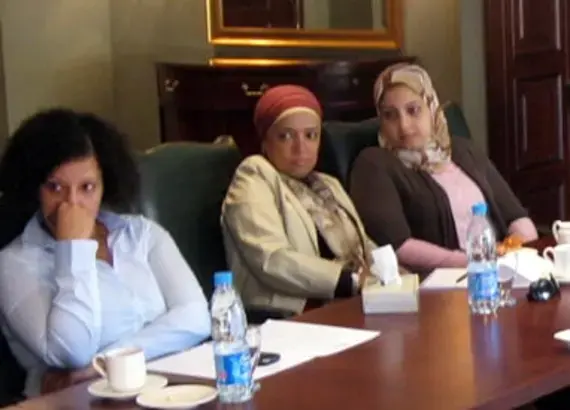
Success Story
Women Leaders in Egypt Learn from Global Transition Experiences
The demonstrations in Cairo's Tahrir Square, in addition to toppling Egypt's long-time leader, gave a push to efforts by the country's women for equal rights.
Now, Egyptian women are organizing to ensure that they remain equal partners in the ongoing political transition. To that end, NDI has been connecting Egyptian women’s groups with women leaders and organizations from Cambodia, Chile and the United States to share their own experiences and insights into building political power.
Meeting by video conference, members of Egyptian political parties, potential candidates, representatives from women’s rights groups and journalists have met with Carla Koppell, head of the women’s office at the U.S. Agency for International Development; Eugenia Hirmas, former socio-cultural minister under Chile’s President Michelle Bachelet; and Mu Sochua, Cambodian member of parliament and women’s rights activist. Each of these exchanges has stressed the need for Egyptian women to build diverse coalitions that emphasize the benefits of equal rights for women to society as a whole.
Hirmas spoke about how, during the time of dictator Augusto Pinochet, it was less dangerous for Chilean women than men to be on the streets looking for disappeared relatives, which helped women organize and legitimize their role in society and demand their rights. She told the Egyptian women, “It is not enough to stay home and know that you are part of a party — you have to participate!” When Pinochet’s 17-year reign ended in 1990, she said she believed that Chile might achieve a woman president by her granddaughter’s generation, yet through hard work, the country elected a woman president only 16 years later.
“It is not enough to stay home and know that you are part of a party — you have to participate!”
- Eugenia Hirmas
Mu stressed the need to form a broad coalition of women cutting across political parties and organizations. To include as many women as possible, she recommended that activists use the media to recruit and take the time to understand what women truly need in order to create a broad movement with appeal to women from all parts of society.
The Egyptians also used the conferences to network among themselves, share their stories and strategies and build connections among organizations focusing on different aspects of women’s rights. After the first video conference, Azza Kamel from Appropriate Communication Techniques for Development (ACT), an NDI partner, invited all the participants to join a new coalition aimed at keeping women’s voices in the political transition process. Most participants are now a part of the network. After the second conference, women from participating civil society groups were exploring ways to work together with participants' political parties, offering to train women candidates as they prepare their campaigns.
The work with the women is part of a larger effort by NDI since the revolution to connect civil society and political party leaders with those who played prominent roles in democratic transitions in their own countries. At the Institute’s invitation Genaro Arriagada and Sergio Bitar, both leaders in the Chilean “No” campaign that ended General Pinochet’s dictatorship, traveled to Cairo to meet with Egyptian leaders on the techniques and importance of forming broad coalitions. Others who came as part of the program were Janusz Onyskiewicz, a former Solidarity activist who later became Poland’s minister of defense, and Agus Widjojo, a retired general who was influential in the Indonesian military’s decision to withdraw from politics. They discussed the military’s role in their countries’ transitions and how the Egyptian military could foster democracy. In addition, NDI arranged for a delegation of Egyptians to travel to Jakarta, Indonesia, to meet with principal players in that country’s transition.
In the coming months, NDI will continue to connect political and civic experts from around the world with Egyptian women’s groups and others as they work through issues surrounding upcoming elections, constitution reform and other aspects of the transition.
Related:
Pictured above: Representatives from the Karama Organization, the Egyptian Foundation for Family Development and NDI listen to the experiences of Janusz Onyskiewicz.
Published June 30, 2011



